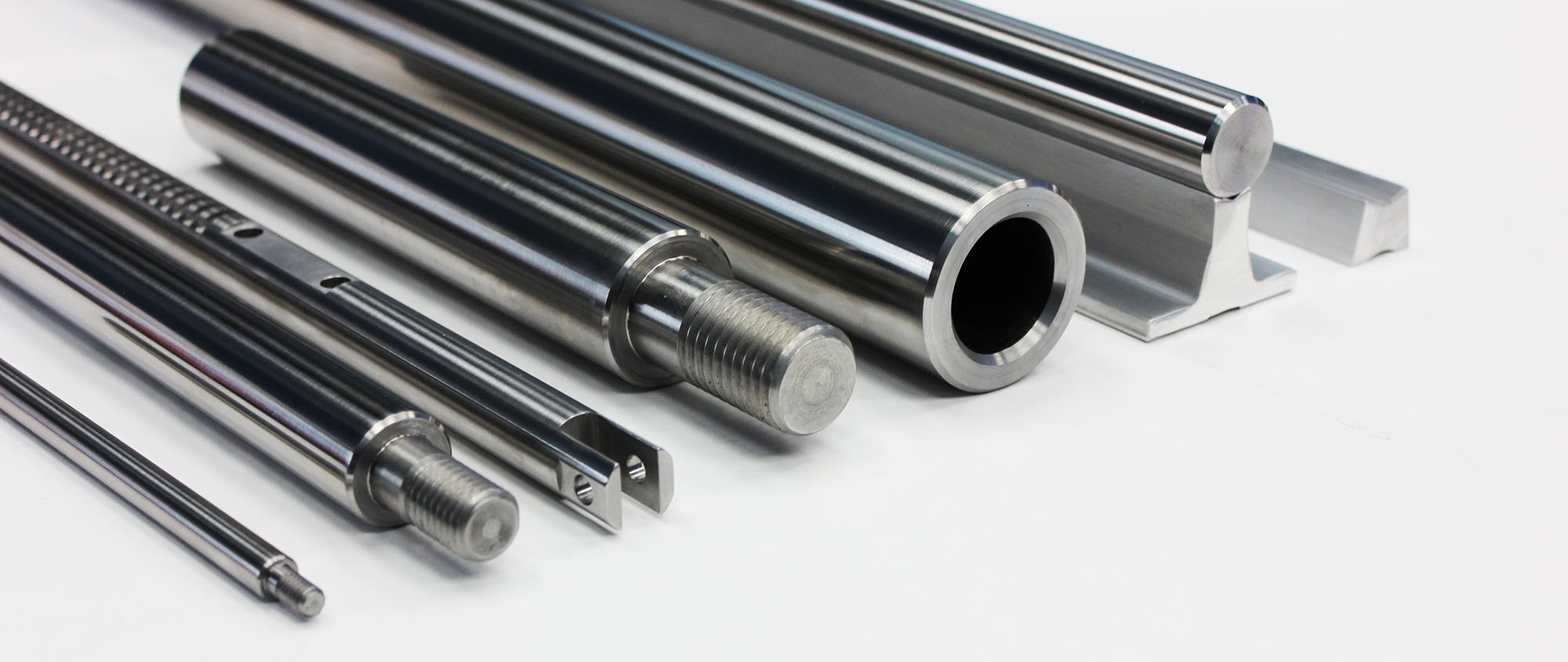Linear shafts are elongated, rod-shaped devices that provide linear motion for power transmission applications. Some linear shafts have axial or radial holes for mounting to support structures. Others are grooved for the placement of snap rings or channelled for keyways. Solid or hollow linear shafts with male or female threads and stepped or chamfered ends are also available.

Most linear shafts are made of aluminum, alloy steel, carbon steel, stainless steel, composite materials, or plastics.
- Alloy steel is harder than carbon steel and provides superior durability.
- Stainless steel is well-suited for applications in which corrosion resistance is an important consideration.
- Aluminum linear shafts provide good electrical and thermal conductivity, high reflectivity, and resistance to oxidation.
- Composite materials are often made of carbon fibers bonded together by resins. They are not as strong as metal shafts, but are lightweight and help reduce energy requirements
Linear shafts are usually coated or hardened to improve durability.
- Anodizing is a protective surface coating process used mainly with aluminum products.
- Black oxide coatings are applied to steel or stainless-steel shafts to prevent ion corrosion.
- Ceramic coatings provide a wear-resistant finish while chromium coatings improve corrosion resistance and reduce friction.
Linear shafts with nickel or nitride coatings are also available. Teflon®, a registered trademark of DuPont Dow Elastomers, is a class of fluoropolymer resins that is resistant to high temperatures, chemical reactions, corrosion, and stress cracking. Linear shafts that are coated with PTFE are used in a variety of applications. Some steel shafts are case-hardened with carbon or nitrogen. Others are through-hardened to ensure that the entire shaft has the same hardness.
Linear Shaft Hardness
There are several ways to measure the hardness of linear shafts.
- The Rockwell hardness test presses a steel or diamond cone against a test sample and measures the depth of the resulting indentation. Higher measurements indicate harder materials. For linear shafts, common Rockwell hardness ranges are 50 to 59, 60 to 69, and 70 to 79.
- The Brinell hardness test subjects a test material to a load of 3000 kg with a hardened steel or carbide ball that is 10 mm in diameter.
- The Knoop hardness test also measures a material’s hardness through its resistance to indentation.
- The Vickers hardness test indents a test material with a diamond indenter that is shaped into a right pyramid with a square base and an angle of 136° between opposite faces.
Specifications
Important specifications for linear shafts include shaft diameter or width, maximum length, weight, height, and tolerance•
- Most linear shafts have circular or square cross sections and are produced in standard lengths that can be cut to size for specific applications.
- Weight is measured in per unit distance, typically pounds per feet.
- Ultra precision shafts have a very tight tolerance.
- Standard grade and precision grade linear shafts are also available.
Standards
Linear shafts must adhere to standards to ensure proper quality, design and functionality. Here in SKAMAR MANUFACTURING we the linear shaft experts.
After 40 years in business, we are still laser-focused on Linear Automation. Offering a host of Shafting solutions to every type of application across all industries. Our experience in machining, our investment in technology, and our industrial partnerships have made us a leader in Linear Shafting and Custom Component Manufacturing. Our focus is not to be the biggest linear company, but rather to be the most qualified.
Check out why we are the best in business.
Your safe partner- SKAMAR MACHINING
https://skamar.com/
PHONE
Call us on:
(216) 249-8670
FAX
Send us a fax:
(216) 249-8674
ADDRESS
1540 Coit Ave.
Cleveland, Ohio 44112-2062